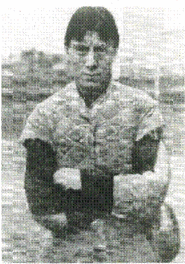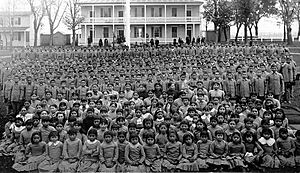Frank Hudson (American football) facts for kids
Quick facts for kids
Frank Hudson
|
|
|---|---|

A photo of Frank Hudson from the American Indian Athletic Hall of Fame
|
|
| Born | 1875 |
| Died | December 24, 1950 (aged 74–75) |
| Citizenship | United States |
| Alma mater | Carlisle Indian Industrial School |
Frank Hudson (born 1875 – died 1950) was a famous Native American football player and coach. He was a member of the Laguna Pueblo tribe from New Mexico.
He played college football for the Carlisle Indian Industrial School from 1895 to 1899. Many people thought he was the best kicker in early American football. In 1898, he became the first Native American player to be chosen as an All-American. This means he was recognized as one of the best players in the country. He was picked as a first-team All-American by Outing magazine in both 1898 and 1899.
From 1904 to 1906, he worked as an assistant coach for the Carlisle football team. This made him one of the first non-white coaches in college football history.
Contents
Early Life and Home
Frank Hudson was born around 1875 in Paguate, New Mexico. His exact birth date is not known. He was part of the Laguna Pueblo tribe, a Native American group with a long history in the Southwest.
Carlisle Indian School
Hudson left his home in New Mexico to go to the Carlisle Indian Industrial School. This was a special school in Carlisle, Pennsylvania, for Native American children from many different tribes. The school aimed to help them learn new skills and fit into the wider American culture.
While at Carlisle, Hudson became a star player on the school's football team. He played as the quarterback as early as 1895. In December 1896, he played in a game that was said to be "the first game under electric light." Carlisle won that game against Wisconsin. Even though he was small for a football player, only five feet, three inches tall and weighing 130 pounds, he was very skilled.
Football Star Player
Amazing Kicks in 1897
In 1897, Hudson became famous for his amazing drop-kicks. A drop-kick is when a player drops the ball and kicks it just as it bounces off the ground. He made successful field goals against two of the best teams in the country: Yale and Penn.
In a game against Penn, Hudson scored all of Carlisle's points. The New York Times newspaper wrote that "little Hudson showed his ability as a kicker." In a game against Yale, played in New York, Hudson's field goal was described as one of the "prettiest ever seen." The crowd cheered loudly for him.
The success of the Carlisle football team made Native Americans very proud. After the Yale game in 1897, the school newspaper, Indian Helper, described a big celebration. The football team was given a special ride, pulled by the whole student group. The band played music, and everyone cheered. It was a big surprise and showed how much the school admired the team's "clean playing."
Team Captain in 1898
In 1898, Frank Hudson became the captain of the Carlisle football team. In one game against Yale, he scored all of Carlisle's points with a "marvelous" kick from 45 yards away. The next week, he again scored all of Carlisle's points in a game against Harvard.
At the end of the 1898 season, Hudson was chosen as the first-team quarterback on Outing magazine's All-America team. This was a huge honor, as he was the first Native American player ever to be named an All-American.
Successful 1899 Season
Hudson continued to be the quarterback and drop-kicker for the 1899 Carlisle Indian team. They had a great season, winning 9 games and losing only 2. In a game against Harvard, Hudson's kicking was a highlight again. The New York Times reported that his kick "went straight through the goal posts."
For the first time, Carlisle beat one of the "Big Four" college football teams, defeating Penn 16 to 5. The 1899 Carlisle team also gained more fame after beating Columbia 45-0 on Thanksgiving Day in New York. Hudson made four drop-kicked goals after touchdowns and one field goal in that game.
The newspaper noted how unique Hudson's drop-kicking was. He chose to drop-kick for all his goals instead of having someone hold the ball for him. This was new for a big game, and he was very successful. Because of their strong performance, the 1899 Carlisle team was ranked No. 4 in the country by famous sports writer Walter Camp.
For the second year in a row, Hudson was chosen as a first-team All-American by Outing magazine. He was also named a third-team All-American by Walter Camp. The 1899 season ended with a 2-0 victory over an undefeated University of California team on Christmas Day. On their way back from California, the team stopped at the Haskell Indian Institute in Kansas. A 12-year-old boy named Jim Thorpe, who would later become a famous athlete, was in the crowd that greeted Hudson and the team.
Lasting Impact
Even years after he stopped playing, Frank Hudson was still seen as the greatest kicker in football history. In 1910, a sportswriter said that Hudson was the "greatest goal kicker known to football." He could even drop-kick from as far as 55 yards away!
Football Coach
In 1904, Hudson became an assistant coach for the Carlisle football team. The national news paid attention to this, as it was an "experiment" to have Native Americans coach the team. The Boston Daily Globe wondered if they would be as smart and skilled as other coaches.
In 1905, Hudson was in charge of coaching the running backs and training the kickers. In 1906, he coached the Carlisle team along with Bemus Pierce, with Pop Warner as an advisor.
Later Life and Legacy
Frank Hudson also worked as a banker for many years, from at least 1900 to 1926. In 1904, a school newspaper reported that he was a main clerk in a bank in Pittsburgh. It said that Frank did more to help people understand Native Americans than many organizations.
Later in his life, Hudson became a farmer. He never married. He passed away in December 1950 from a brain bleed at his farm in Bucks County, Pennsylvania. In 1973, after his death, he was honored by being added to the American Indian Athletic Hall of Fame.
See also
- Benjey, Tom (2008). Doctors, Lawyers, Indian Chiefs: Jim Thorpe & Pop Warner's Carlisle Indian School football immortals tackle socialites, bootleggers, students, moguls, prejudice, the government, ghouls, tooth decay and rum, pp. 54–60. Tuxedo Press, ISBN: 978-0-9774486-7-8.
 | Misty Copeland |
 | Raven Wilkinson |
 | Debra Austin |
 | Aesha Ash |



